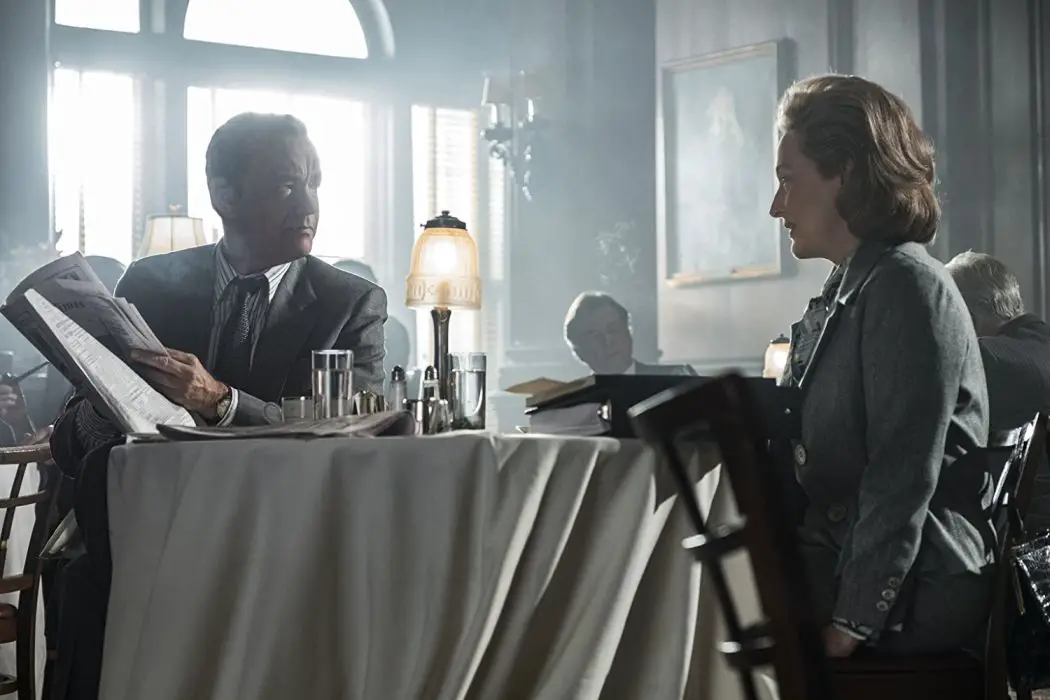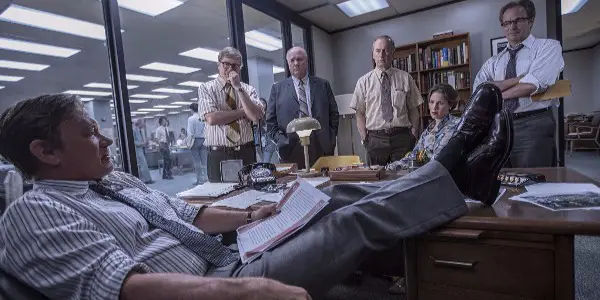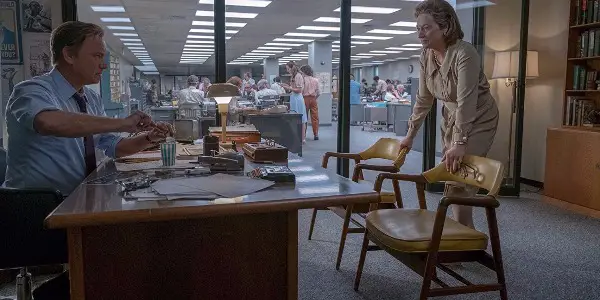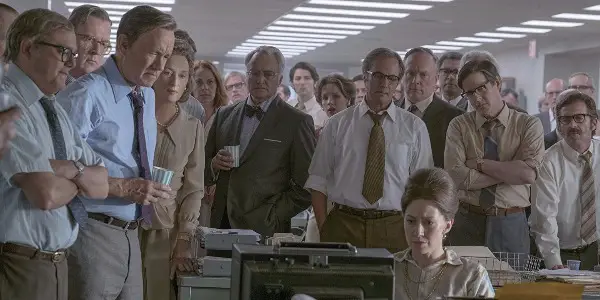THE POST: An Unexpected Spielberg Disappointment

Alistair is a 25 year old writer based in Cambridge.…
When Steven Spielberg read the first draft of Liz Hannah and Josh Singer’s screenplay The Post, he committed to making the film without hesitation. In his own words, “this wasn’t something that could wait three years or two years – this was a story I felt we needed to tell today”.
Although a historical drama set during the early seventies, there are numerous parallels between the government of Richard Nixon and that of Donald J Trump, not least the fact that both have gone out of their way to restrict the first amendment and effectively silence unfavourable reporting. The story of journalists fighting to speak truth to power, in the face of legal battles they can’t win and mounting financial pressure, is one that still rings true over four decades later.
Burying the Lede
So, despite this relevance and the pedigree in front of and behind the camera, why has The Post left me feeling cold, especially considering its status as a surefire awards contender? Throughout the film, I was reminded of the reason Quentin Tarantino decided to make Django Unchained – after a preview screening of Spielberg’s Amistad, he wished the movie focused entirely on the slave ship revolt, instead of the extensive legal battle that followed.
Here, I was left wishing that The Post actually spent more time on the actual reporting of the Pentagon Papers themselves, that highlighted the important journalistic work being undertaken, instead of having to be subjected to a plethora of legal briefings and meetings with financiers concerned with the story’s publication.

It’s not that The Post is a bad film by any means. It just spends less time on the elements that make it dramatically engaging, in order to highlight its contemporary relevance – the cinematic equivalent of “burying the lede”. It may perform well during awards season for this very reason, but it’s not a film that will reward repeat viewings in the future, as its dramatic flaws will be all the more apparent once its moment has passed.
The dramatisation of real events
Opening in 1967, military analyst Daniel Ellsberg (Matthew Rhys) grows disenfranchised with the government attempting to favourably spin the failing war in Vietnam, that he has personally seen to be a surefire loss. In this dramatisation of events, Ellsberg takes a copy of the classified documents, which have been compiled since 1945, and in 1971, gives copies to Washington Post journalist Ben Bagdikian (Bob Odenkirk), who has found the scoop the financially failing newspaper has been striving for.
Post editor Ben Bradlee (Tom Hanks) has grown increasingly frustrated with the New York Times always beating them to major scoops, even when they’ve been sent directly to his office. But after the Times gets silenced by Nixon’s administration, he sees it as a duty to report on the findings in the Pentagon Papers, despite widespread concerns of legal ramifications. Financial pressure also comes from Post owner Kay Graham (Meryl Streep), who has had to put the paper on the stock market to help secure the business’ future – something put in jeopardy due to the seismic ramifications reporting this story could hold.

As you would expect, strong performances are given by the entire ensemble, which also includes a murderer’s row of established character actors in minor roles. However, the biggest revelation here is three time Academy Award winner Meryl Streep, as this marks the first time in over a decade where she actually disappears in to the character she’s playing, and not giving an oversized caricature of a performance.
Streep returns to form – while Spielberg reverts to autopilot
I’ve previously joked that the only time I’ve ever agreed with Donald Trump is when he called Meryl Streep overrated, at least based on her track record over the last ten years. Performances in films like The Iron Lady and Florence Foster Jenkins don’t feel grounded in the same reality these very real people lived in, with Streep’s performances always feeling overly pronounced and histrionic, desperate for awards and never once allowing me to forget I’m seeing Meryl Streep, and not the character she is portraying, on screen.
Although the Oscar talk for this performance is fairly ludicrous, it is definitely a step in the right direction for Streep – even the most awards baiting moments in the performance, such as a tearful bedside monologue to Alison Brie’s character, feel grounded and believable. It’s the sight of an actor reminding audiences why they are so beloved in the first place, actually striving for the critical goodwill she’s been coasting by on for years, regardless of the performance she’s been giving.
However, the screenplay’s mistake is focusing on the business-minded issues faced by the characters played by Streep and Hanks – the moments the film lives up to its lofty potential are when Odenkirk’s Ben Bagdikian is allowed out of the office to follow the murky trail towards the Pentagon Papers scoop. It is the most engaging element of the narrative, leaving me perplexed as to why its treated more like a side issue, as the film chooses to focus on the stress of running a daily newspaper instead.

In recent years, Spielberg’s dramatic efforts have proved to be more engaging than his attempts at rekindling the strengths of his populist blockbuster heyday – largely because he’s now more nakedly displaying visual influences from some of the finest filmmakers across cinema history. Lincoln was a stylistic love letter to John Ford, while his underrated late period masterpiece Bridge of Spies marries the paranoia of a cold war thriller with the humanist Americana of Frank Capra.
Moving further forward through cinema history, The Post feels like it should be a spiritual heir to the “paranoia trilogy” of Alan J Pakula, which dealt with shady government conspiracies relevant to the Watergate era – and climaxed with All the President’s Men, the definitive cinematic depiction of journalism, which in terms of the timeline, The Post effectively acts as the prologue towards (a cheeky final sequence here hints at the Watergate bombshells about to drop).
Unfortunately, from a directorial standpoint, The Post doesn’t depict the intrigue of investigative reporting in a similarly engaging light – even though the moments it does follow this narrative path are the film’s most effective. Spielberg’s direction has plenty of moments to flourish, from realisations of major historical events including the depiction of mass street protests, to smaller comedic touches like Odenkirk’s reporter struggling with using a payphone while juggling a multitude of important documents.
Yet when the drama is squarely focused on the struggles of the newspaper itself, these flourishes dissipate, and it becomes one of the more workmanlike films he has made this decade, with only the strengths of the performances saving the film from sheer monotony during these long stretches of the running time.
Conclusion: The Post
The Post confirms that Spielberg is now more adept at making dramas for adult audiences than he is making blockbusters – and I will definitely take ten of these over a spectacular misfire like The BFG. But I can’t help but feel the film is less than the sum of its parts; an effectively directed and acted film, in service of a story that cares more about the financial state of the newspaper than the gripping account of how The Pentagon Papers made the jump from classified documents to front page news.
Spielberg felt this story urgently needed to be told, yet he has left the story that needs to be heard firmly in the margins; seeing the contemporary political parallels with the saga of the Post’s freedom of speech issues in the early seventies has left the great filmmaker with a myopia that has left him temporarily blind as to what makes an engaging dramatic narrative.
What are the best films about journalism- and which ones are the most relevant in the Trump era?
The Post gets a limited release in the US on December 22nd, before opening wide on January 12th, 2018. It opens in the UK on January 19th, 2018, and all international release dates are here.
Does content like this matter to you?
Become a Member and support film journalism. Unlock access to all of Film Inquiry`s great articles. Join a community of like-minded readers who are passionate about cinema - get access to our private members Network, give back to independent filmmakers, and more.
Alistair is a 25 year old writer based in Cambridge. He has been writing about film since the start of 2014, and in addition to Film Inquiry, regularly contributes to Gay Essential and The Digital Fix, with additional bylines in Film Stories, the BFI and Vague Visages. Because of his work for Film Inquiry, he is a recognised member of GALECA, the Gay & Lesbian Entertainment Critics' Association.













